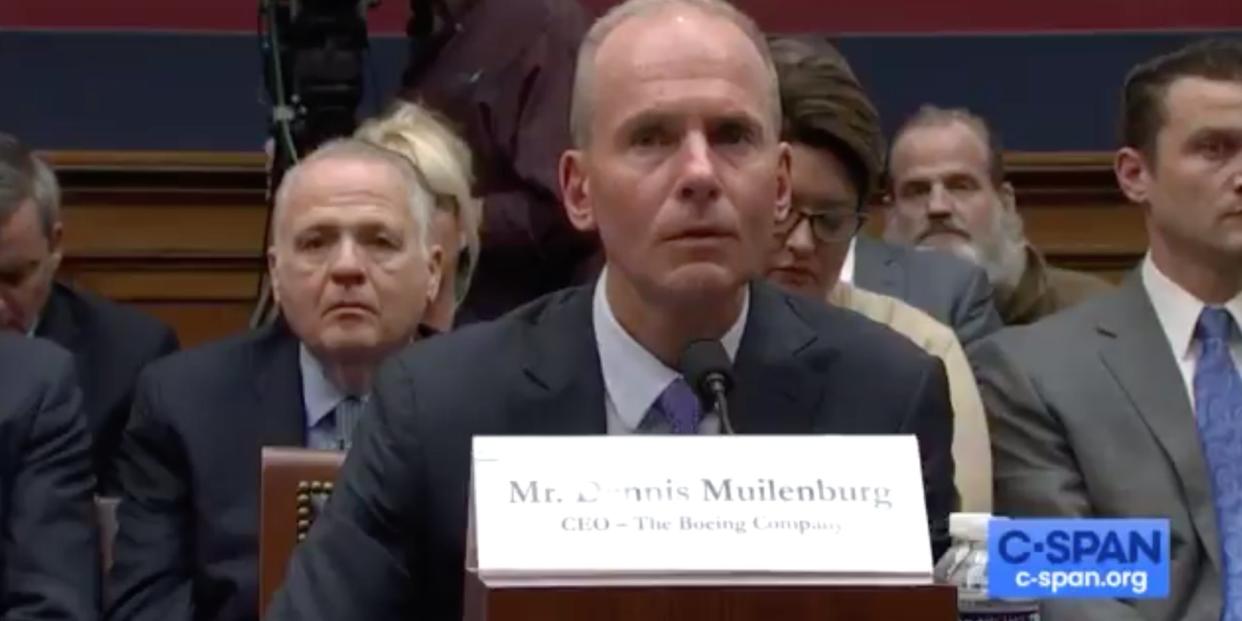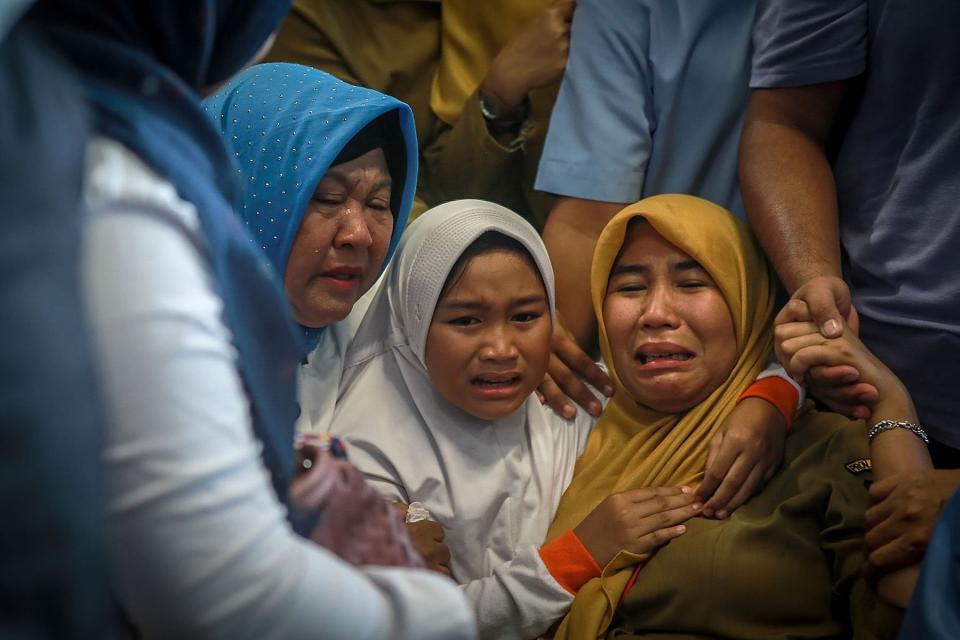Boeing's CEO was at a loss for words when he got hammered over attempts to move lawsuits from 737 Max victims' relatives to Indonesia

C-Span
Boeing's CEO was lost for words when he was grilled by lawmakers on Wednesday about the company's efforts to move legal cases from one of the fatal 737 Max crashes out of the US.
Dennis Muilenburg repeatedly said that he was not familiar with the company's strategy, which it said it would execute back in March, before it opened settlement talks with the families.
During a hearing of the House Committee on Transportation and Infrastructure Wednesday, Rep. Peter DeFazio expressed disbelief that the CEO could be in the dark about the company's efforts.
He then pointed to a Business Insider article from June about how the threat of moving the cases overseas was still on the table.
Moving the cases would leave families with almost nothing and put Boeing under less scrutiny, lawyers told Business Insider for that story.
Muilenburg later committed to updating the committee as to whether the company was still trying to move the cases.
Boeing's CEO was at a loss for words when he was interrogated by Congress over the company's attempts to move lawsuits filed by the families of those killed in one of the 737 Max crashes to Indonesia.
Rep. Henry Johnson questioned Boeing CEO Dennis Muilenburg about the company's stated intention to try and move the cases from the first crash outside of the US to Indonesia — where the crash occurred — at a meeting of the House Committee on Transportation and Infrastructure Wednesday.
In response, Muilenburg said: "Congressman, I can't comment on that. I'm just not familiar with the details of that."
Boeing had stated in court in March that it would try and move the cases from the first crash to Indonesia, but has since opened settlement talks with families without committing to keeping the cases in the US if those talks fail.
Johnson then asked Muilenburg: "So are you here to say that your company would not take efforts to protect itself from the US court system insofar as the victims of these air crashes are concerned?"
Muilenburg again said: "I don't know the answer."

HADI SUTRISNO/AFP/Getty Images
Peter DeFazio, the chair of the committee, later hammered Muilenburg, questioning how, as CEO of the company, he could not be aware of the company's legal strategy in dealing with the two 737 Max crashes, which killed 346 people.
The first, involving a Lion Air flight in Indonesia, killed 189 people in October 2018, while a second, involving an Ethiopian Airlines plane, occurred in March 2019, killing 157 people.
DeFazio pointed to a Business Insider story by this reporter from June, in which multiple lawyers representing victims' families said they were preparing to fight efforts by Boeing, and in which multiple experts said moving the cases would make them "worthless" for the families and put Boeing under less scrutiny.
A transcript of DeFazio and Muilenburg's exchange can be seen below:
DeFazio: This took me 30 seconds with a Google search. June 13th, Business Insider: "The company is arguing for the cases to be moved from the US to Indonesia." And you would have us believe that you are not aware? Your legal team, they're so far distant from you? You don't talk to them? This hasn't been discussed on the board?
My wife was the risk manager for the city of Eugene, Oregon, for a long time. She had to pay the claims. When a big claim came, just a couple of million bucks against the city, she was involved, the city manager was involved, the legal team was involved, everybody was involved.
You're looking at hundreds of millions, billions of dollars of claims — you're trying to move to a country, and this expert says [quoting Business Insider's story again]: "Having a trial in a another country, with a different legal culture, less scope for close scrutiny of Boeing, would render the cases 'worthless.'"
And you don't know that that's happening, that you're making that pleading?
Muilenburg: Congressman, I'm aware of those articles ... but ... as I stated earlier ...
DeFazio [interrupting]: Would you please respond to the committee, after you consult with your lawyers, have they filed to move these cases to Indonesia, in any court in the United States, or do they intend to?
Muilenburg: Mr Chairman, we'll follow up with that information.
You can watch the exchange here:
Tweet Embed:
//twitter.com/mims/statuses/1189871759245352960?ref_src=twsrc%5Etfw
The moment yesterday when @sineadbaker1's reporting on Boeing's handling of the 737 Max disasters was cited in a Congressional hearing.
Here is the @businessinsider story referred to by Rep. DeFazio:https://t.co/2RQXjucAWS pic.twitter.com/fFCdD3vp3p
Boeing is currently in settlement talks with some families, and has settled the cases with some families.
But lawyers for the families told Business Insider that Boeing could continue to threaten to move the cases in a bid to drive down the amount that they are willing to settle for, and it is unclear if the company will pursue that strategy or commit to keeping the cases in the US.

REUTERS/Sarah Silbiger
Muilenburg, in the exchange above, promised to clarify the company's strategy to the committee.
Different compensation laws and laws around evidence mean that "if Boeing can get the cases sent back to either Indonesia or Ethiopia, those cases really become worthless," Mike Danko, an aviation attorney and pilot, who is not involved in the cases, told Business Insider in June.
Brian Kabateck, a lawyer representing multiple families of those killed in the first crash, told Business Insider that the cases should stay in the US as: "These aircrafts were designed in the US, conceived in the US, built in the US, sold in the US."
"I think everything critical that went wrong on that aircraft happened as a result of something that happened in the United States," he said.
Boeing has also separately made a $100 million fund available to victims' families, and has said that using the fund will not prevent families from being able to pursue legal action.
NOW WATCH: Here's why in-flight WiFi is so slow and expensive

